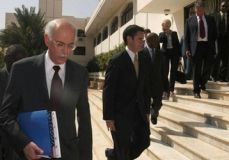US policy review on Darfur opens door for concessions
Nov 2, 2006 (WASHINGTON) — The United States looks set to pull back from its aggressive approach to ending what it calls genocide in Sudan’s Darfur region in a major concession to the regime in Khartoum, according to former US officials and Africa experts.
 President George W. Bush announced a policy review this week after repeatedly failing to obtain Sudanese government compliance with a US-sponsored UN resolution demanding the deployment of UN peacekeepers in war-torn Darfur.
President George W. Bush announced a policy review this week after repeatedly failing to obtain Sudanese government compliance with a US-sponsored UN resolution demanding the deployment of UN peacekeepers in war-torn Darfur.
Under pressure ahead of next week’s midterm US elections, in which a raft of foreign policy stalemates weigh heavily upon his Republican Party, Bush said he would seek a new plan for Darfur acceptable to the Sudanese government.
“The United States is going to work with the international community to come up with a single plan on how to address this issue and save lives,” Bush said following a meeting Tuesday with his personal envoy to Sudan, Andrew Natsios.
“Andrew is going to work with other partners in peace, and they’ll take that plan to the current government of Sudan,” Bush said.
While the White House followed up Bush’s announcement Wednesday by renewing a series of aid and trade sanctions which have been in place against Sudan for several years, no further details of the policy review were given.
Natsios, who visited Sudan last week, gave Bush a grim report on the situation in Darfur, a region the size of France where at least 200,000 people have died and 2.5 million have been left homeless since a rebellion against the Khartoum government broke out in early 2003.
The fighting pits the regime in Khartoum and allied Arab militia against Darfur’s mostly black African population, which is seeking autonomy for the region.
The UN Security Council adopted a resolution in July mandating the deployment of some 20,000 peacekeepers to replace an under-funded African Union force in Darfur that has failed to halt the violence.
But President Omar al-Beshir’s government refused to accept the UN force, insisting instead that the African Union mission, over which it has more influence, be reinforced.
The US State Department initially threatened to push for deployment of the UN troops even without Khartoum’s consent, but never acted in the absence of support from other UN members.
In the meantime, fighting between rebel and government forces in Darfur has intensified, cutting off humanitarian access to hundreds of thousands of displaced civilians.
In announcing the US policy rethink on Tuesday, Bush set alarm bells ringing by omitting any mention of a UN peacekeeping mission, referring only to the need to deploy “an effective international force” to Darfur.
His remarks were widely seen as opening the door for a compromise solution involving a beefed-up African Union force, or the deployment of an Arab- or Muslim-led mission more to Khartoum’s liking.
A senior State Department official on Wednesday lent credence to that view, saying there were “a lot of different ways” to draw up an international force that was “sustainable and robust” enough to tackle Darfur. He declined to elaborate.
The prospect of a policy turnaround amid ongoing violence in Darfur was assailed as “shameful” by one former official involved in the issue.
“If where we’re headed now is some sort of appeasement or accommodation with the government of Sudan so they can yet again cherry pick and constrain a new peacekeeping force, we really are complicit in failing to stop this second wave of genocide,” said Susan Rice, the State Department’s top Africa official in the previous administration of president Bill Clinton.
Rice and other critics of Bush’s policy on Darfur, including Clinton national security adviser Anthony Lake, called for unilateral military action in Darfur, including the imposition of a NATO-enforced no-fly zone over the region.
“A step forward would be to seriously consider putting real pressure on Khartoum, including the no-fly zone, … to force them to accept the UN force,” Lake said.
But such combative measures would antagonise key Arab allies as well as China, a major purchaser of oil from Sudan, at a time when Washington needs their support in dealing with the conflict in Iraq and the twin nuclear stalemates with Iran and North Korea.
Another option discussed by US officials involves offering new incentives to Khartoum to accept a more robust peacekeeping force, including lifting the just-renewed sanctions on Sudan.
(AFP)
